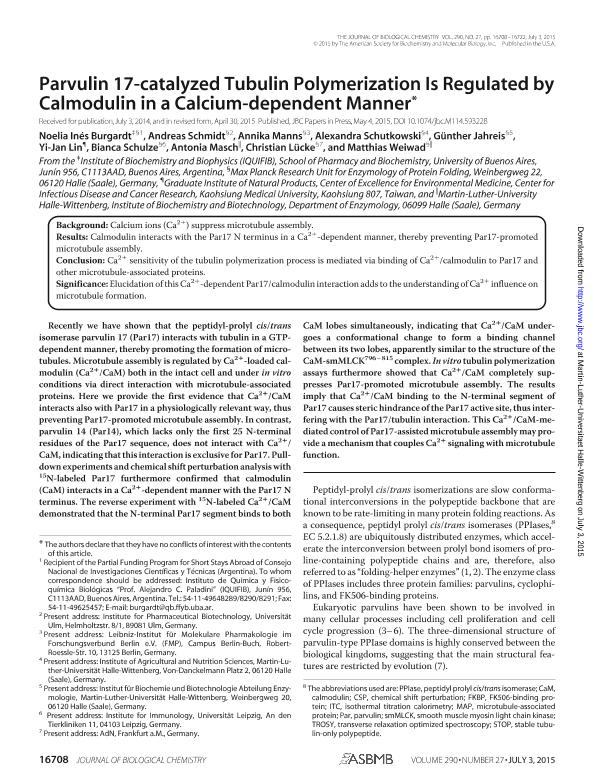Mostrar el registro sencillo del ítem
dc.contributor.author
Burgardt, Noelia Ines

dc.contributor.author
Schmidt, Andreas

dc.contributor.author
Manns, Annika
dc.contributor.author
Schutkowski, Alexandra
dc.contributor.author
Jahreis, Günther
dc.contributor.author
Lin, Yi Jan

dc.contributor.author
Schulze, Bianca
dc.contributor.author
Masch, Antonia
dc.contributor.author
Lücke, Christian

dc.contributor.author
Weiwad, Matthias

dc.date.available
2018-12-27T17:22:45Z
dc.date.issued
2015-07
dc.identifier.citation
Burgardt, Noelia Ines; Schmidt, Andreas; Manns, Annika; Schutkowski, Alexandra; Jahreis, Günther; et al.; Parvulin 17-catalyzed tubulin polymerization is regulated by calmodulin in a calcium-dependent manner; American Society for Biochemistry and Molecular Biology; Journal of Biological Chemistry (online); 290; 27; 7-2015; 16708-16722
dc.identifier.issn
0021-9258
dc.identifier.uri
http://hdl.handle.net/11336/67072
dc.description.abstract
Recently we have shown that the peptidyl-prolyl cis/trans isomerase parvulin 17 (Par17) interacts with tubulin in a GTPdependent manner, thereby promoting the formation of microtubules. Microtubule assembly is regulated by Ca2+-loaded calmodulin (Ca2+/CaM) both in the intact cell and under in vitro conditions via direct interaction with microtubule-associated proteins. Here we provide the first evidence that Ca2+/CaM interacts also with Par17 in a physiologically relevant way, thus preventing Par17-promoted microtubule assembly. In contrast, parvulin 14 (Par14), which lacks only the first 25 N-terminal residues of the Par17 sequence, does not interact with Ca2+/CaM, indicating that this interaction is exclusive for Par17. Pulldown experiments and chemical shift perturbation analysis with 15N-labeled Par17 furthermore confirmed that calmodulin (CaM) interacts in a Ca2+-dependent manner with the Par17 N terminus. The reverse experiment with 15N-labeled Ca2+/CaM demonstrated that the N-terminal Par17 segment binds to both CaM lobes simultaneously, indicating that Ca2+/CaM undergoes a conformational change to form a binding channel between its two lobes, apparently similar to the structure of the CaM-smMLCK796-815 complex. In vitro tubulin polymerization assays furthermore showed that Ca2+/CaM completely suppresses Par17-promoted microtubule assembly. The results imply that Ca2+/CaM binding to the N-terminal segment of Par17 causes steric hindrance of the Par17 active site, thus interfering with the Par17/tubulin interaction. This Ca2+/CaM-mediated control of Par17-assisted microtubule assembly may provide a mechanism that couples Ca2+ signaling with microtubule function.
dc.format
application/pdf
dc.language.iso
eng
dc.publisher
American Society for Biochemistry and Molecular Biology

dc.rights
info:eu-repo/semantics/openAccess
dc.rights.uri
https://creativecommons.org/licenses/by-nc-sa/2.5/ar/
dc.subject
Nuclear Magnetic Resonance
dc.subject
Protein-Protein Interaction
dc.subject
Parvulin
dc.subject
Calmodulin
dc.subject.classification
Otras Ciencias Biológicas

dc.subject.classification
Ciencias Biológicas

dc.subject.classification
CIENCIAS NATURALES Y EXACTAS

dc.title
Parvulin 17-catalyzed tubulin polymerization is regulated by calmodulin in a calcium-dependent manner
dc.type
info:eu-repo/semantics/article
dc.type
info:ar-repo/semantics/artículo
dc.type
info:eu-repo/semantics/publishedVersion
dc.date.updated
2018-09-11T14:52:08Z
dc.journal.volume
290
dc.journal.number
27
dc.journal.pagination
16708-16722
dc.journal.pais
Estados Unidos

dc.journal.ciudad
Bethesda
dc.description.fil
Fil: Burgardt, Noelia Ines. Consejo Nacional de Investigaciones Científicas y Técnicas; Argentina. Max Planck Research Unit for Enzymology of Protein Folding; Alemania
dc.description.fil
Fil: Schmidt, Andreas. Max Planck Research Unit for Enzymology of Protein Folding; Alemania
dc.description.fil
Fil: Manns, Annika. Max Planck Research Unit for Enzymology of Protein Folding; Alemania
dc.description.fil
Fil: Schutkowski, Alexandra. Max Planck Research Unit for Enzymology of Protein Folding; Alemania
dc.description.fil
Fil: Jahreis, Günther. Max Planck Research Unit for Enzymology of Protein Folding; Alemania
dc.description.fil
Fil: Lin, Yi Jan. Kaohsiung Medical University; Alemania
dc.description.fil
Fil: Schulze, Bianca. Max Planck Research Unit for Enzymology of Protein Folding; Alemania
dc.description.fil
Fil: Masch, Antonia. Martin Luther University Halle Wittenberg; Alemania
dc.description.fil
Fil: Lücke, Christian. Max Planck Research Unit for Enzymology of Protein Folding; Alemania
dc.description.fil
Fil: Weiwad, Matthias. Max Planck Research Unit for Enzymology of Protein Folding; Alemania. Martin Luther University Halle Wittenberg; Alemania
dc.journal.title
Journal of Biological Chemistry (online)

dc.relation.alternativeid
info:eu-repo/semantics/altIdentifier/url/http://www.jbc.org/content/290/27/16708
dc.relation.alternativeid
info:eu-repo/semantics/altIdentifier/doi/https://dx.doi.org/10.1074/jbc.M114.593228
Archivos asociados
